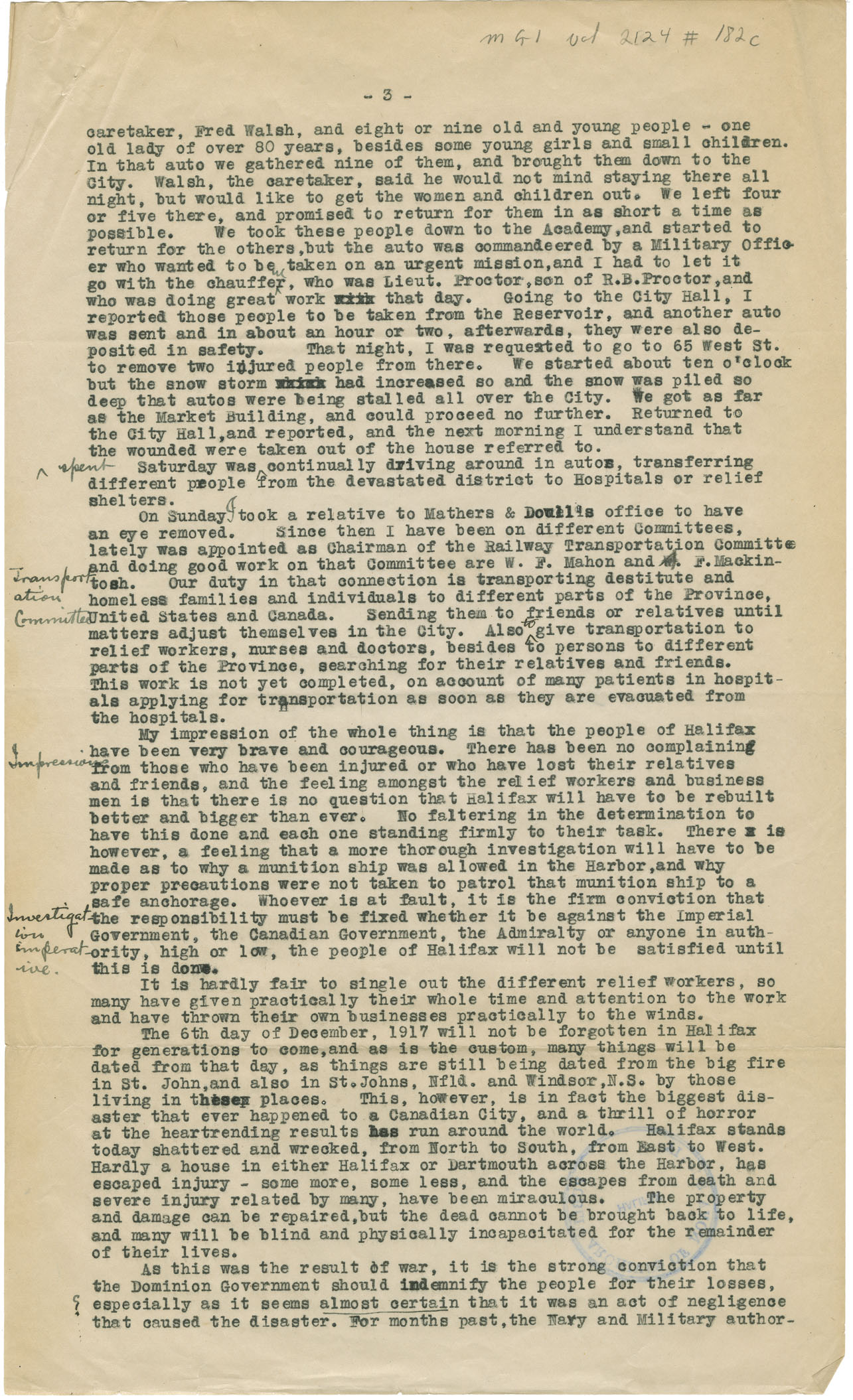Nova Scotia Archives
Archibald MacMechan
Halifax Disaster Record Office Materials
Personal narrative - Mr. W. A. Major
5 pages : 30 x 50 cm.
note: transcription publicly contributed - please contact us with comments, errors or omisions
MG 1 volume 2124 number 182c
- 3 -
caretaker, Fred Walsh, and eight or nine old and young people - one old lady of over 80 years, besides some young girls and small children. In that auto we gathered nine of them, and brought them down to the City. Walsh, the caretaker, said he would not mind staying there all night, but would like to get the women and children out. We left four or five there, and promised to return for them in as short a time as possible. We took these people down to the Academy, and started to return for the others, but the auto was commandeered by a Military Officer who wanted to be taken on an urgent mission, and I had to let it go with the chauffer, who was Lieut. Proctor, son of R.B. Proctor, and who was doing great work [xxx] that day. Going to the City Hall, I reported those people to be taken from the Reservoir, and another auto was sent and in about an hour or two, afterwards, they were also deposited in safety. That night, I was requested to go to 65 West St. to remove two injured people from there. We started about ten o'clock but the snow storm [xxxxx] had increased so and the snow was piled so deep that autos were being stalled all over the City. We got as far as the Market Building, and could proceed no further. Returned to the City Hall, and reported, and the next morning I understand that the wounded were taken out of the house referred to.
Saturday was [spent] continually driving around in autos, transferring different people from the devastated district to Hospitals or relief shelters.
On Sunday, I took a relative to Mathers & Doull's office to have an eye removed. Since then I have been on different Committees, lately was appointed as Chairman of the Railway Transportation Committee and doing good work on that Committee are W. F. Mahon and F. Mackintosh. Our duty in that connection is transporting destitute and homeless families and individuals to different parts of the Province, United States and Canada. Sending them to friends or relatives until matters adjust themselves in the City. Also to give transportation to relief workers, nurses and doctors, besides to persons to different parts of the Province, searching for their relatives and friends. This work is not yet completed, on account of many patients in hospitals applying for transportation as soon as they are evacuated from the hospitals.
My impression of the whole thing is that the people of Halifax have been very brave and courageous. There has been no complaining from those who have been injured or who have lost their relatives and friends, and the feeling amongst the relief workers and business men is that there is no question that Halifax will have to be rebuilt better and bigger than ever. No faltering in the determination to have this done and each one standing firmly to their task. There is however, a feeling that a more thorough investigation will have to be made as to why a munition ship was allowed in the Harbor, and why proper precautions were not taken to patrol that munition ship to a safe anchorage. Whoever is at fault, it is the firm conviction that the responsibility must be fixed whether it be against the Imperial Government, the Canadian Government, the Admiralty or anyone in authority, high or low, the people of Halifax will not be satisfied until this is done.
It is hardly fair to single out the different relief workers, so many have given practically their whole time and attention to the work and have thrown their own businesses practically to the winds.
The 6th day of December, 1917 will not be forgotten in Halifax for generations to come, and as is the custom, many things will be dated from that day, as things are still being dated from the big fire in St John, and also in St. Johns, Nfld. and Windsor, N.S. by those living in those places. This, however, is in fact the biggest disaster that ever happened to a Canadian City, and a thrill of horror at the heartrending results has run around the world. Halifax stands today shattered and wrecked, from North to South, from East to West. Hardly a house in either Halifax or Dartmouth across the Harbor, had escaped injury - some more, some less and the escapes from death and severe injury related by many, have been miraculous. The property and damage can be repaired but the dead cannot be brought back to life, and many will be blind and physically incapacitated for the remainder of their lives.
As this was the result of war, it is the strong conviction that the Dominion Government should indemnify the people for their losses, especially as it seems almost certain that it was an act of negligence that caused the disaster. For months past, the Navy and Military author-
spent [handwritten in left margin beside second paragraph and meant to be inserted in first sentence of paragraph]
Transportation Committee [handwritten in left margin beside third paragraph]
Impressions [handwritten in left margin beside fourth paragraph]
Investigation imperative [handwritten in left margin beside fourth paragraph]
? [handwritten in left margin beside last paragraph]
States the case of Annie Campbell, also typed account 29 December 1917, by W. A. Major.
Reference: Archibald MacMechan Nova Scotia Archives MG 1 volume 2124 number 182

